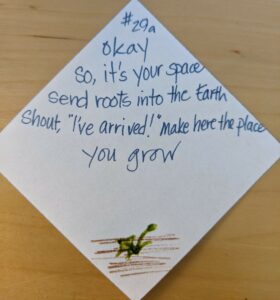Greetings! Welcome to another Poetry Peeps adventure on Poetry Friday!
 You’re invited to our challenge in the month of May! After such a big month for National Poetry Month, we’re taking it easy for now. Our simple task is to write a poem with the theme of string, thread, rope, or chain. Any poetic form, rhymed or unrhymed, but we’re including one of those four items. Plotting? Good! You’ve got a month to string your line(s), then share your offering on May 27th in a post and/or on social media with the tag #PoetryPals. Can’t wait to see what you come up with!
You’re invited to our challenge in the month of May! After such a big month for National Poetry Month, we’re taking it easy for now. Our simple task is to write a poem with the theme of string, thread, rope, or chain. Any poetic form, rhymed or unrhymed, but we’re including one of those four items. Plotting? Good! You’ve got a month to string your line(s), then share your offering on May 27th in a post and/or on social media with the tag #PoetryPals. Can’t wait to see what you come up with!
This month the Poetry Peeps wrote poems in imitation of Taylor Mali. For Laura, that meant this poem – short(ish) and sweet. Tricia explored her ideas here. Sara’s meta poem ON the poet is here, Cousin Mary Lee enfolded climate greening into her poem, Liz’s project, plus a bonus poem is here, and Andi’s popped in here. More Poetry Peeps may pop in with more words and thoughts as the weekend continues, so stay tuned. I may be very slow doing the roundup (as in finishing it next week), since I’m away from my usual haunts (and time zones) so bear with me.
I started out with the best of intentions to flatter poet Taylor Mali by imitating “Totally Like Whatever, You Know?” Alas, the longer I spent with it, the less I found flattering to say. Published in 2002, soon after the 1998 “Ebonics” conversation the talk show circuit, this poem is reflective of the social critics of that time, which is to say it hasn’t aged well. Mali’s mocking contempt echoes still of American society’s knee-jerk tendencies to mock and belittle the young, especially young girls, for the way that they speak, act, the media they consume, the bands they love, and the clothes they wear. When devaluing fully 51.1% of the population becomes automatic, misogyny persists, and follows girls into adulthood. More importantly, it leaves a mark. And men aren’t the only people who belittle and begrudge the young; it’s an American past time, which is why this poem so needled me.
I remember running into my 8th grade English teacher as a college student. She quizzed me on my activities and my GPA, and then, as I was proudly telling her my news, she interrupted. Reaching forward, she fiddled with my collar, smoothing it. “You know,” she said in a low, confiding voice like she was revealing a secret, “You’d sound so much smarter if you didn’t say ‘um, okay’ quite so often.” Well, that was me told that I wasn’t up to her level! Rather than enjoying my weekend home, I spent the rest of the time listening to myself, wincing at each “um” and “okay” and wondering desperately how people ever learned to change their speech.
I look back on that incident and seethe.*
My NPM project this year was sticky-note proverb poems. They are proverb-based and SHORT, but Taylor Mali doesn’t lend himself to short, so today I’ve creating two poems, first, the freestyle, unrhymed imitation (not my favorite style; feel free to suggest revisions in the comments), using the words of consent and consensus which are so often dismissed, and second, a sticky-note sized distillation. Additionally, today’s poem calls for a new proverb, one I’ve just made up. It is:
“Wisdom celebrates variation; not every difference suggests flaws.”
um, okay
Okay, but have you noticed
how it is somehow A-okay fine
for them to get right in your face
straighten up your collar and say
“right, if you would just -” and
okay, you knew you weren’t up to par –
yeah, you couldn’t pass as perfect
or more than okay, but who is?
Okay, so, have you noticed
the ground between us
is like potholes and mountains,
it’s that uneven, which is like,
fine, whatever
but what makes them think
the place they’re standing is
always the high ground, right?
Okay, but had you noticed
how they steal your words when they
crush your voice, grind words into pulp,
when they smother your spark
had you noticed why? they silence you –
like you’re just a piece of work
right, but if they would just,
back off, you could work out
making the pieces
whole, right?
Okay, so you had noticed
that consensus creates strength, that two heads
are better than one? so, okay you seek approval –
yeah, sometimes you ask permission –
So? you don’t know if you’re allowed
to take up space, to speak
aloud, so you rehearse
your sounds, right?
and you check your strengths
’til you know them
by heart.
Okay, so had you noticed
your flex, your stretch, how strong
you’ve grown? they did not, which is like,
fine, whatever –
you’ve blown past their
okay

bloom
okay
so, it’s your space
send roots into the earth
shout “I’ve arrived! make here the place
you grow
Want more poetry? Poetry Friday is hosted today at Jone’s place.. Hope you have a wonderful weekend.
*I taught school, too. I recognize that for some, the job is changing the world through their students. But, I’d really rather leave the world unchanged than be remembered for the kind of casual cruelty that implies someone sounds/is stupid.
Would you be interested in adding bloom with your name at the bottom to my Poetryliscious Gallery padlet at https://padlet.com/cvarsalona/q1uymnafyupx3w8c? Thanks.
@cvarsalona: Thanks for the invite to the padlet! I’m in!
Tanita, there are so many ideas to like in your Taylor-Mali-like poem. First, your proverb is right on! “Wisdom celebrates variation; not every difference suggests flaws.” “um,okay” i hear you! The post-it note poem is a great ending.
Would you be interested in adding bloom with your name at the bottom to my Poetryliscious Gallery padlet at https://padlet.com/cvarsalona/q1uymnafyupx3w8c? Thanks.
Your poem doesn’t need a critique, just reading, over and over. You showcase why and how the language that’s ridiculed can be a door to understanding, and wow—that ending:
fine, whatever –
you’ve blown past their
okay
I hope you submit this to an anthology.
@SaraLewisHolmes: Wow, I… will definitely think about it. Thank you.
Wow, yes claim that space it’s yours and it’s terrific! Loved both poems and the back story too. I’m also loving your book, “Partly Cloudy” that I’m presently reading… Thanks for all your word wizardry and beautiful descriptive passages!
@Michelle K, Art: Thank you! And I am so glad you’re enjoying Partly Cloudy!
It’s very good!!! ^_^
Wowzy! Tell us how you really feel, Tanita! Here’s the thing. I’m divided. I don’t want to devalue, but I do want kids to speak in a way that makes them feel strong and confident and heard. I hope I’d never singled out a student or speak dismissively to them. But I do hope, if I were still teaching 8th grade English, that I’d have classroom discussions around WHY we use comfort phrasing, whether it’s “um” while presenting in public (guilty!) or “like” twice in every sentence. I think our job as grownups is to help kids learn to express themselves well because they deserve to be listened to, and expressing themselves well (in public situations) will help them say what’s important to them and to say it powerfully. Hmmm. Complicated topic (to me). I love your bitter, snarky tone here and the triumphant ending!
@LauraSalas: I very much agree that a teacher’s job is to teach HOW to do things, and to think about WHY. I role played with my students a lot, we did a lot of work on how to get along in public sans parents – so they could ask for change, order things, make small talk with strangers. Lots of practice perfects the job, and speaking extemporaneously is where my kids tripped and fell the most… so we practiced some more because I wanted them to learn how to be taken seriously wherever and whenever they spoke. I DO agree, I don’t think it serves the student to be encouraged to simply marinate in whatever speech patterns they use among friends; I believe students have to be culturally bilingual – speaking the language of adulthood/commerce as well as the language of friendships/home. (This is especially fraught with Black students, or students from shared cultures with a particular patois; do I insist they speak in a way that robs them of identity just so that they won’t be the subject of a punchline among educated White adults? What’s my job, here?)
HOWEVER, it still bugs the heck out of me that Taylor Mali, this oh-so-revered teacher who made himself famous with his teaching poetry, felt it was a-okay fine to be dismissive of those same students in a very public way — even if they were much older, it still feels like a betrayal to me. I know I’m super sensitive to this sort of thing, though.
Zing! This should be required reading in teacher education courses, but also in every classroom. Students (especially girls) would feel so SEEN.
I love this: “but what makes them think
the place they’re standing is
always the high ground, right?”
And all of that third stanza. Plus the way you condensed it down onto your sticky!!
@CousinMaryLee: It’s not hard to have tons of good ideas now that I’m no longer teaching, but… I think of this often, how as a young teacher my older teachers were still telling me how to be. And how disillusioning that was… I cannot imagine this woman ever thinking she could have learned something from me, but… that she couldn’t was a failure of HER imagination…
There’s so much to love here. The encounter you describe is painful. I saw it happen a lot when I was on sabbatical – well-meaning teachers telling kids their “flaws” were hurting their chances at something. The second stanza, however, is my favorite. It’s so painfully true, especially today.
I love the short version and the fact that you titled it bloom.